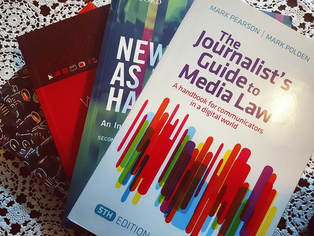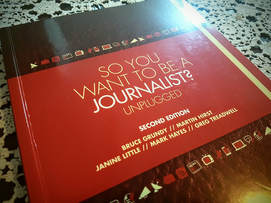|
21/9/2017 0 Comments Journalism 101 On the other side of my love for all things writing and reading is my passion towards journalism. If you have read the 'About' page, you would have noticed that I study journalism on top of professional writing, creative writing and linguistics. As a curious person, I enjoy asking questions to get to the facts of a situation, to learn more about a person or to make connections. As a journalist, I think it's important to have this urge to know more and to strive towards completely understanding situations to present them to the public with all the facts. This blog post will highlight the basics of journalism and maybe you'll find yourself inspired towards this profession, to tell the story of others and the world around you. Journalism can get a bad wrap from time-to-time. With trends such as 'fake news' being thrown around, it can be hard to trust what is reported or journalist's in general. Over the time I have studied the profession I have found that the best news is presented when it sticks to the basics. When they are flouted on the basis of acquiring viewers or readers, distrust grows and the respectability of the profession decreases. This blog is about storytelling, and if a story isn't written or told effectively, the main point is missed and chances are people aren't going to read or listen to the end. This is the same with journalism. The stories a journalist tells provides the public information and facts about situations that could be important to them, and, therefore, it is crucial that the basics are covered. So let me expand on what these are.  I will first mention before I delve into this blog post that what I distinguish as 'the basics' is what I have been taught early on in my studies and might be different elsewhere. Also, what I list as important in journalism are based on my opinions since others might think that there are other skills and concepts that are more important. The first basic concept that a journalist needs to understand is the idea of being objective. Journalist's are there to cut through the lies and find the facts. There shouldn't be a bias or a subjective point of view, with the exception of opinion pieces or feature stories (facts are still important nonetheless). With the increasing popularity of citizen journalism and the need to have the news provided instantly online, the skills to separate oneself from a story and provide objectivity can sometimes be lost. This can be difficult because some stories might be on a sensitive subject, which is where objectivity can be difficult or seen as rude or immoral. Objectivity also tends to disappear subtly regarding politics or political issues. At the end of the day, a journalist is there to provide the news and to do so is to provide the facts. What makes news? How do journalists decide one story is better than another? There are a few news values that encapsulate what gets priority in reporting. It makes sense that a story where many people in a high-risk situation (e.g. an earthquake, storm, bushfire, etc.) will be focused on more than what are called 'fluffy' stories (e.g. animals at a zoo). However, one argument that is brought up a lot nowadays is why some stories of conflict are not given as much attention. The values listed below show the basic values a story should have, and the more they have generally decides the level of focus or priority they get.
It's a long list but if you have a clear understanding on those values, then finding and writing news becomes a lot easier. If you can think of a story that covers all of those values, then you have found a story that is journalistic gold. The last journalism basic that I will cover is about how journalists decide what questions to ask. This links with the basics of storytelling and takes us back to when we were in primary school learning about how to write effectively. This is the good ol' 5 W's and H concept: who, what, where, when, why and how. When a journalist first starts writing a story, they need to cover all of those points in the first couple of paragraphs. This helps reader's decide if they want to continue reading the article or to move on. Therefore, when a journalist is going to interview someone, they need to ask questions like 'What happened?' 'When did it occur?' 'How did you feel?' 'Where were you?' etc. These are the basics around journalism. They become more specific depending on the area of journalism and for people wanting to study or become journalists themselves there are a lot more complex concepts and issues that you need to know beforehand. These include the specifics in media law, what is expected of you in your particular field, the appropriate language and tone to use in the medium your using, and more. I think it is very important for all journalists to remember and keep reminding themselves of these basics to produce respectable and trustworthy news that sticks to the facts. However, I also think that writer's in general should become aware of these because it can help with refining and identifying style and tone. I only wanted to cover the basics in this post. However, if you'd like to know more about the specifics, go ahead and ask! If there are enough recommendations or people want me to write more about this, I will be happy to in future! Hopefully you have learned something new or even felt interested and inspired by the concept of journalism. Let me know what you think
0 Comments
Leave a Reply. |
AuthorCharlotte is a reading and writing lover who has completed a creative writing intensive course at the University of Oxford and is a current university student studying a double degree in journalism and creative writing. If you are curious to learn more, check out the 'About' page. Archives
January 2019
Categories |
 RSS Feed
RSS Feed